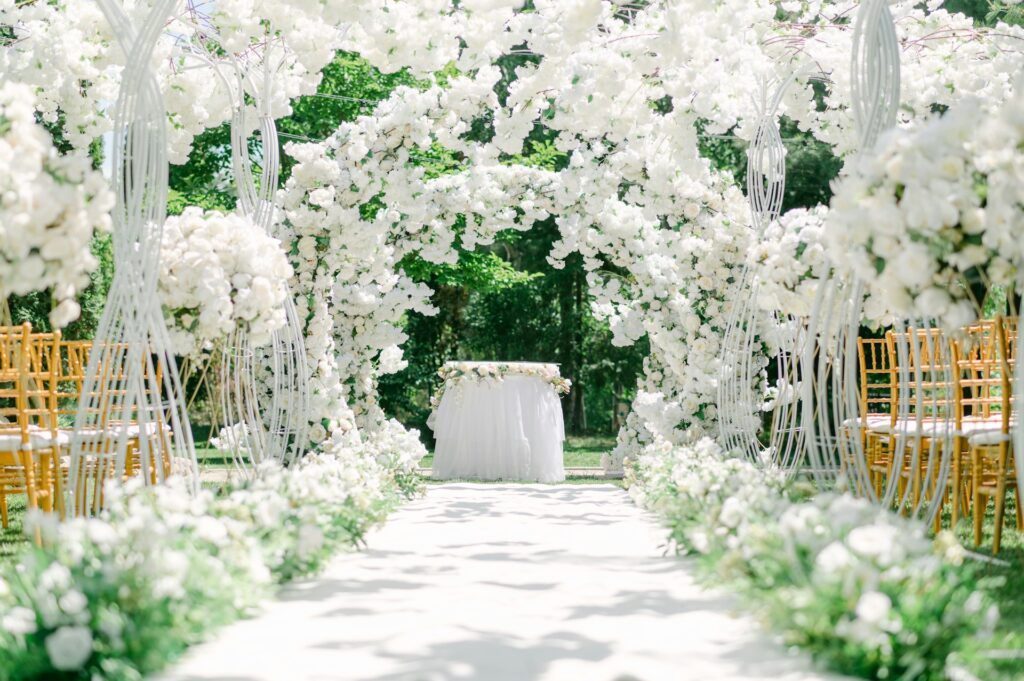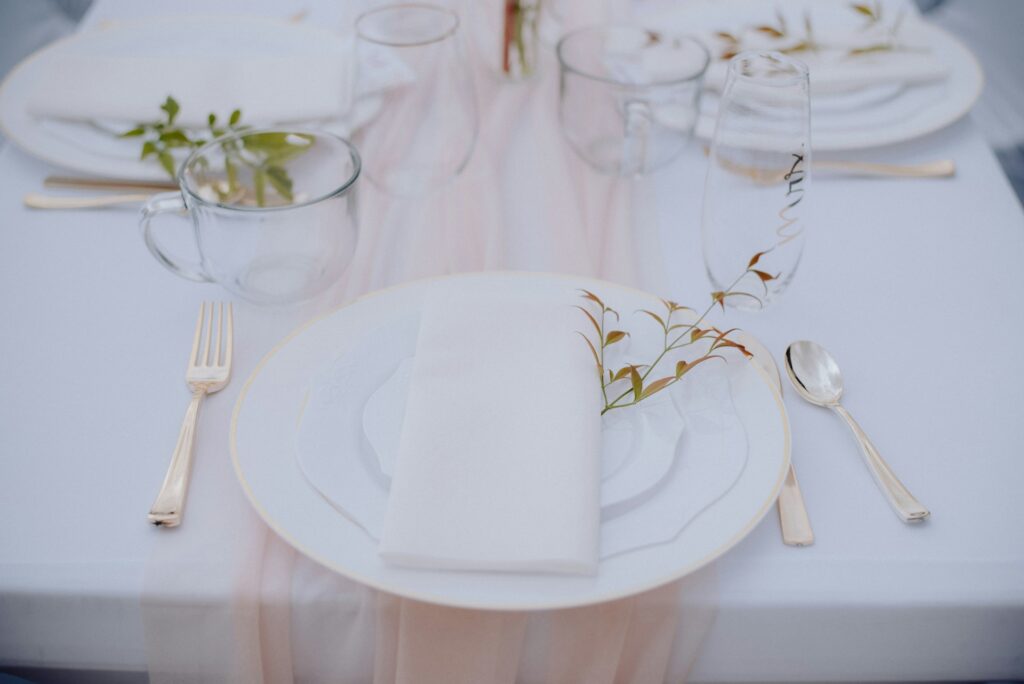Choosing the ideal wedding venue is one of the most important choices you make when planning your big day. The right location sets the tone for the entire event, aligning with your vision, budget and guest experience. With so many wedding venues to choose from, narrowing down your choices can feel overwhelming. This guide provides tips and essential considerations to help you choose the perfect arrangement with confidence, while ensuring it matches your wedding outline and overall theme.
1. Define your wedding vision and style
Before you start looking for a wedding venue, take some time to imagine the style and atmosphere you want for your wedding. Knowing whether you want a rustic barn, an elegant ballroom, or a modern rooftop ceremony can simplify the selection process.
- Consider theme and tone: Traditional, bohemian, vintage or modern? Each theme is suitable for a different type of venue. For example, vineyards and gardens are perfect for a rustic or romantic theme, while a stylish city center loft might suit a modern wedding.
- Outdoor vs. indoor: Decide if you want to have your ceremony or reception outdoors (which is common with summer weddings), or if you’d prefer a cozy indoor setting. Consider the weather and make backup plans for an outdoor wedding.
2. Determine your budget

Your budget is a key factor that affects every aspect of your wedding. wedding venue It often takes up a large portion of the budget, so it’s crucial to know how much money you can allocate.
- All-inclusive vs. a la carte: Some venues offer packages that include catering, decor and furnishings, while others only offer space. All-inclusive venues can simplify planning but may cost more. If you’re on a tight budget, the a la carte option allows you to bring in suppliers, potentially lowering costs.
- Seasonal pricing: Some venues have different prices depending on the season, and prices are usually higher during peak wedding periods (such as summer and early fall). Choosing an off-season date or a weekday wedding can save you money.
3. Consider guest capacity and comfort
The size of your guest list will play a big role in venue selection. Every venue has a maximum capacity limit, so choosing a space that can comfortably accommodate the number of guests is important to the overall experience.
- First Guest List Second Location: Create a rough guest list before visiting the venue to ensure the space you choose doesn’t feel crowded or too empty.
- spacing requirements: Some weddings require additional space to accommodate elements such as a dance floor, cocktail hour, and seating arrangements. If you have a specific wedding outline Including a reception desk made up of multiple components, confirming that the venue layout can accommodate all these elements.
4. Check venue availability
Popular wedding venues are often booked well in advance, especially during peak seasons. Identifying a venue early in the planning process can help ensure you get the location and dates you want.
- Flexible dates: If your wedding date is flexible, you’ll have more venue options to consider. However, if you have a specific date in mind, start your search as soon as possible.
- Tour venues: Visiting a venue in person can provide insights you can’t get from photos. Doing the event on the same day of the week and at the same time of day can give you a better idea of the lighting, space, and overall atmosphere.
5. Assess location and accessibility
The location of your venue can impact your guests’ experience and impact your wedding day logistics.
- Nearby accommodation: If your guests are coming from out of town, choose a location near your hotel or arrange group accommodation. Consider whether the venue offers shuttle service or whether guests will need to drive.
- Parking and Accessibility: Make sure the venue has ample parking, especially in busy areas. For guests with limited mobility, check to see if the venue has ramps, elevators or other accessibility features.
6. Evaluate on-site services and facilities
Many wedding venues offer on-site services that can streamline your planning process and enhance your event experience.
- Catering and bar services: Some venues offer in-house catering, which makes managing the menu easier. If the venue allows for outside caterers, consider whether you will need additional space for food preparation.
- Equipment and decoration:Ask if the venue provides essentials such as tables, chairs and linens, or if you will need to rent them. Some venues provide interior decoration or have preferred suppliers provide flowers, lighting and audio-visual equipment.
- wedding coordinator services: Venues that offer an in-house coordinator can help with wedding day scheduling and logistics, taking the stress off of you. If the venue offers this service, they can assist you in adhering to the wedding outline.
7. Review the mood and atmosphere of the venue

The aesthetics of your venue are crucial to creating the wedding experience you want. Each venue has a unique atmosphere, ranging from historic charm to modern elegance.
- natural lighting: Lighting affects the overall atmosphere and photography quality. If possible, visit the venue at the same time as your planned wedding to assess natural lighting.
- Decorative flexibility: Some venues have strict decorating policies, so make sure you can personalize the space to suit your theme. If candles, open flames or hanging decorations are important to you, make sure they are allowed.
8. Understand any restrictions and rules
Many wedding venues have specific rules and regulations, so clarify any restrictions before making your final decision.
- Noise Ordinances and Curfews: Some venues have noise restrictions or early curfews, especially outdoor or residential venues. If you’re planning a lively dance reception, make sure the venue’s policies accommodate this.
- external supplier: Some venues require you to use their preferred vendors for services such as catering, bartending, and DJing. If you have a specific supplier in mind, confirm that they will be allowed to work on the site.
9. Consider the logistics of your wedding ceremony outline
If you plan to hold your ceremony and reception at the same location, consider the logistics of transitioning between the two.
- Separate ceremony and reception space: If the venue offers both indoor and outdoor areas, you have the flexibility to use one area for the ceremony and the other for the reception. This arrangement helps guests enjoy the different environments and creates a seamless flow.
- Preparing the space before the ceremony: If your wedding outline includes pre-ceremony photos, make sure there is a dressing room or wedding party prep area. Many venues offer a bridal suite or groom’s room for the couple and their entourage to get ready.
in conclusion:
Choosing the right wedding venue requires balancing practicality with your personal style and preferences. By clarifying your vision, budget, and specific needs (such as adhering to a wedding outline), you’ll be able to narrow down your options and make an informed decision.
More reading

